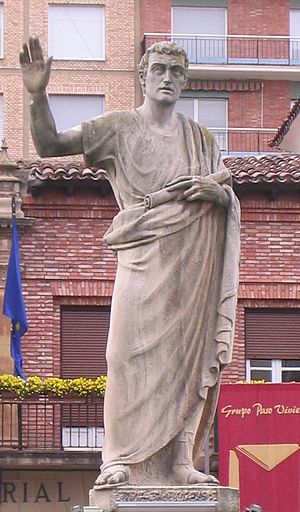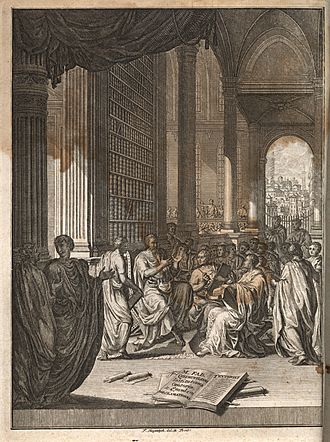Quintilian facts for kids
Quick facts for kids
Quintilian
|
|
|---|---|
| Marcus Fabius Quintilianus | |

|
|
| Born | c. 35 |
| Died | c. 100 |
|
Notable work
|
Institutio Oratoria |
| Scientific career | |
| Notable students | Pliny the Younger Tacitus (disputed) |
| Influences | |
| Influenced | |
Marcus Fabius Quintilianus (born around 35 AD – died around 100 AD), known as Quintilian in English, was an important Roman educator and rhetorician. He was born in Hispania (modern-day Spain). His ideas about speaking and teaching were very popular in medieval schools and during the Renaissance.
Contents
Who was Quintilian?
Quintilian was born around 35 AD in a town called Calagurris, which is now Calahorra in La Rioja, Spain. His father was well-educated and sent him to Rome to study rhetoric. Rhetoric is the art of speaking or writing effectively.
Early life and studies
In Rome, Quintilian studied with a famous speaker named Domitius Afer. Afer was known for a more traditional style of speaking, similar to the famous Roman orator Cicero. Quintilian admired Afer and learned a lot by listening to him speak in court. This experience likely made Quintilian love Cicero's style of speaking.
After Afer died in 59 AD, Quintilian went back to Hispania. He might have worked as a lawyer there. But in 68 AD, he returned to Rome with Emperor Galba. Galba was a short-lived emperor after Nero. Quintilian was not a close advisor to Galba, which probably helped him stay safe when Galba was assassinated in 69 AD.
Becoming a teacher
After Galba's death, Rome went through a confusing time with four emperors in one year. During this period, Quintilian opened his own public school for rhetoric. Some of his famous students included Pliny the Younger and possibly Tacitus.
Emperor Vespasian later gave Quintilian a special title and supported his school with money. Vespasian believed that good education helped create smart and responsible leaders. This support allowed Quintilian to focus more on teaching. He also continued to work as a lawyer, helping people in court.
Quintilian's family life
Not much is known about Quintilian's personal life. In his most famous book, Institutio Oratoria, he mentions that his wife died young. He also had two sons who passed away before him.
Retirement and later years
Quintilian stopped teaching and working as a lawyer in 88 AD. This was during the rule of Emperor Domitian. He might have retired because he had enough money and wanted to enjoy his free time.
Quintilian lived through the reigns of several emperors. The times under Vespasian and Titus were peaceful. However, Domitian's rule was known for being harsh. Quintilian may have quietly stepped back from public life because of this. But Domitian still respected Quintilian. In 90 AD, Domitian even hired Quintilian to tutor his two grand-nephews. Quintilian is thought to have died around 100 AD.
What did Quintilian write?
Quintilian's most important surviving work is a twelve-volume textbook called Institutio Oratoria. This means Institutes of Oratory in English. He wrote it around 95 AD.
Institutio Oratoria explained

Institutio Oratoria is a detailed guide on how to be a great speaker. But it's more than just about speaking techniques. It also covers how a person should be educated and grow from childhood to adulthood to become a good orator.
Quintilian believed that a perfect orator must first be a good person. Only after that can they be a good speaker. He thought that a speech should always be honest and focus on what is "just and honorable." This idea is known as his "good man theory." It means that if you are not truly good, you cannot be a good speaker for the people. A good person works for the benefit of society.
Quintilian wrote this book during the later years of Emperor Domitian's rule. Even though Domitian was a strict ruler, he was impressed by Quintilian's dedication to education. He even hired Quintilian to teach his own family. Quintilian was brave enough to share ideas that were different from the emperor's. He spoke like the great orator Cicero, which was rare at that time. Instead of just arguing legal cases, Quintilian focused on how good speaking could improve people's education.
Other writings
Quintilian also wrote an earlier text called De Causis Corruptae Eloquentiae. This means "On the Causes of Corrupted Eloquence." This book is now lost. It is believed to have contained some of the ideas later found in Institutio Oratoria.
There are also two collections of speeches, Declamationes Maiores and Declamationes Minores. These have been linked to Quintilian. However, some experts believe these might be notes from students who followed Quintilian's teaching style.
Quintilian's ideas on rhetoric
Quintilian's definition of rhetoric is very famous. He used a phrase from Cato the Elder: vir bonus, dicendi peritus. This means "the good man skilled at speaking." He wanted his ideal orator to be like a "Roman Wise Man."
Orator vs. philosopher
Quintilian believed his ideal orator was not a philosopher. This is because philosophers often don't feel it's their duty to be involved in public life. But for Quintilian, being active in civic life was key for an orator. He encouraged speakers to learn from others but also to use their own ideas.
Influence of Cicero and Plato
Quintilian greatly admired Cicero. He asked, "Who can instruct with greater thoroughness, or more deeply stir the emotions?" Quintilian's ideas about rhetoric are very similar to Cicero's. Both believed that a speaker's moral character was very important. They also thought that studying history and philosophy could help an orator speak better.
Quintilian also agreed with Plato's idea that a speaker must be just. He said, "the complete attainment of this art is even impossible without the knowledge of justice." Both Quintilian and Plato believed that good speaking means speaking justly. They saw a strong connection between rhetoric and justice.
How Quintilian influenced others
Quintilian's book, Institutio Oratoria, had a big impact.
Criticism of Seneca
Quintilian criticized the orator Seneca the Younger. Seneca's style of speaking was popular at the time. Quintilian thought Seneca's style was "corrupt and extremely dangerous." He felt it had "attractive faults" that could mislead people. This view of Seneca influenced how people judged Seneca's work for a long time.
Praise from Martial
The Latin poet Martial wrote a short poem about Quintilian in 86 AD. He called Quintilian "greatest director of straying youth" and "an honour... to the Roman toga." However, Martial was known for his clever and sometimes tricky poems. Other lines in the poem suggest Quintilian was also ambitious and sought wealth.
Later influence
After his death, Quintilian's influence changed over time. His student Pliny and possibly Juvenal mentioned him as a successful and serious teacher. From the 3rd to 5th centuries, writers like St. Augustine of Hippo and St. Jerome were influenced by his ideas on language and education.
During the Middle Ages, knowledge of his work declined. But in 1416, a complete copy of Institutio Oratoria was found in a monastery by Poggio Bracciolini. This discovery excited many scholars during the Italian Renaissance. Leonardo Bruni, a famous historian, was thrilled. He wrote that Quintilian's work was "more an object of desire to the learned than any others."
The Italian poet Petrarch even wrote a letter to Quintilian, who was already dead. For many, Quintilian inspired a new way of thinking about education. This enthusiasm spread across Europe. Martin Luther, a key figure in the Reformation, said he preferred Quintilian to almost all other writers. He felt Quintilian taught both how to educate and how to speak well. Erasmus, another important scholar, was also influenced by Quintilian.
Modern influence
After the Renaissance, Quintilian's influence seemed to lessen. He was mentioned by writers like Montaigne and Lessing. But he didn't make a huge impact on intellectual history for a while.
However, in the 19th century, John Stuart Mill, a very influential English thinker, praised Quintilian. Mill said Quintilian's book was like an "encyclopaedia of the thoughts of the ancients on the whole field of education and culture." He kept many valuable ideas from reading Quintilian. Thomas De Quincey also highly praised Quintilian's work.
More recently, Quintilian's importance has grown again. He is often included in books about literary criticism and is a key part of the history of education. He is seen as one of the earliest supporters of "child-centered education." His detailed explanations of rhetorical techniques are still useful for students of speech and writing today. His ideas about figurative language also helped shape modern theories.
See also
- Quadripartita ratio
- Dionysian imitatio
 In Spanish: Quintiliano para niños
In Spanish: Quintiliano para niños
 | Ernest Everett Just |
 | Mary Jackson |
 | Emmett Chappelle |
 | Marie Maynard Daly |

